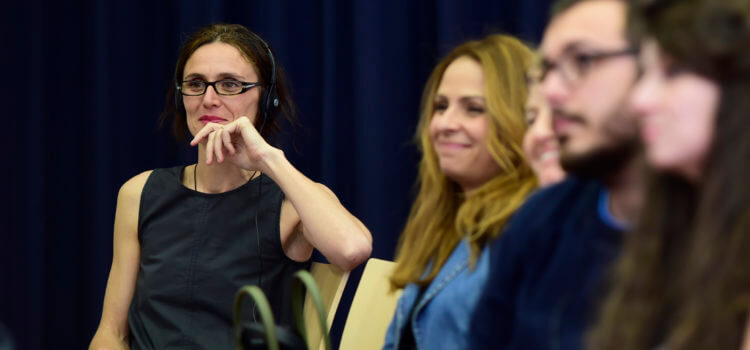
From Munich to Madrid: La Maleta PRIX JEUNESSE visits the Spanish Capital
Eleven years ago, members of Patito Productions for the first time visited the PRIX JEUNESSE festival in Munich (one of which is a co-author of this report). At PRIX JEUNESSE we discovered a new festival concept, one rather different from the commercial events, by focusing on programme excellence. The PRIX JEUNESSE festival changed our way how we understand childhood and how we produce television for children.
This year, thanks to the guidance and collaboration of the members of the worldwide PRIX JEUNESSE network (especially Mariana Cano in Mexico) and to the support of the Goethe Institute Madrid combined with our determination to improve the quality of children’s and youth productions in Spain, we brought the Maleta PRIX JEUNESSE to the city of Madrid for the very first time. We came together at at Goethe Institute Madrid for three days, to screen and discuss a selection of some of the best productions of the PRIX JEUNESSE 2018 edition. The debates were moderated by Kirsten Schneid from PRIX JEUNESSE in Munich and national experts. The programme screenings they were framed by a children’s TV production storytelling workshop, a round table session about “The challenges of making children’s TV in Spain” and a TV Forum in which 40 children participated.
The screened programs were watched with great interest and, in many cases with surprise, since the approach of certain topics is definitely more open-minded that those we are used to here in Spain.
Among the programmes which surprised in the 11 to 15 year-old section was the BBC documentary My Life: Born to Vlog which was felt to be very real and very personally told from the girl’s point of view. The Brazilian drama series Young Hearts also caught the attention “due to its very cinematic approach” (statement by a director), making clear that “old but well developed formulae are still effective”, as a screenwriter noted.
In the 7 to 10 year-old section, the Danish programme Handball Mission was one of the favorites. People liked the Danish perspective of sports as an education value.
Another highlight was the Australian drama First Day about a transgender child, conceived by the attendees as “a risky, but most needed view about the topic”. The German magazine programme Checker Toby – the Life-and-Death-Check was praised for being “a piece which knows how to maintain a very difficult balance.
In the Up to 6 years section, the Norwegian educational series My Body Belongs to Me was a surprise by the way it approaches the topic of child abuse, conceived by some as “too direct and rather aggressive on occasions, I think one can talk clearly about the topic being a bit more subtle”. The experts agreed that these type of shows were necessary but they must be framed by a campaign and should be presented with governmental support.
After watching the diverse shows, the attendees noted that it feels like in Spain there is a tendency to overprotect children and therefore simplify content made for them.
The round table discussion “Challenges of Children’s TV in Spain” moderated by José Luis Farias (Quirino Awards and 3DWire director) generated great interest. Renowned professionals, journalists, psychologists and pedagogues summarized and discussed the current context of children’s media in our country: Víctor López (Zinkia director and Pocoyo producer), Yago Fandiño (children’s content director for RTVE Corporation), Eugenia Nuñez (Panda director), the Evolutionary Psychology Professor Ileana Enesco and Verónica Pastrana (director and producer) who described her experiences with the adaption process to the Spanish culture of the Danish children’s show Teddy Telephone Show which premiered on May 25th on Clan, the Spanish public children’s TV channel.
Overall, the audience was greatly enthusiastic. There was not enough time for all the participants to discuss their point of view in depth. Perhaps a piece of evidence that proves how much there is to know and hear about this sector? In general, there was a feeling that currently in Spain it is a difficult situation and a general lack of attention and interest of the public media for the topic.

The event presented an opportunity for the organizers to plant the seed of a mission: To improve the quality of television for children in Spain. The feeling of lack of time to debate and discuss all the ideas and the common diagnostic about the situation of children’s content in Spain showed that most of the professionals feel that this mission is vital to our society. One of the biggest achievements of the event was to offer a platform to meet and connect with each other. Now, it is time to start the road that leads us to the building of a movement that concerns itself with creating high quality children’s and youth content available to all.
One of the next steps includes a manifesto for all the sector professionals that want to take part. It has been a very rich, hopeful and quite positive experience that we look forward to repeat. Siempre Avanti!
Verónica Pastrana and Luis Alejandro Ruiz
